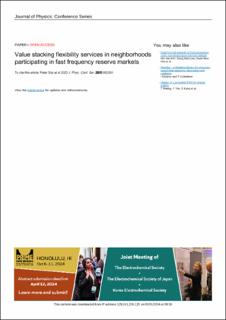Value stacking flexibility services in neighborhoods participating in fast frequency reserve markets
Journal article, Peer reviewed
Published version
Permanent lenke
https://hdl.handle.net/11250/3118893Utgivelsesdato
2023Metadata
Vis full innførselSamlinger
Originalversjon
10.1088/1742-6596/2600/5/052001Sammendrag
Neighborhoods are responsible for considerable amounts of the total energy demand in Europe, and increased shares of variable renewable energy sources will require energy balancing services. Local flexibility resources in neighborhoods can help provide this. However, there is a lack of insight into the economic incentives and operational consequences for property owners to adopt prosumer qualities. Using a linear program that minimizes total electricity costs, this paper evaluates annual cost savings for a Norwegian university campus when value stacking the following flexibility services: responding to electricity spot prices, grid tariffs, and provision of fast frequency reserve (FFR). Several flexibility resources are addressed in this study, including a stationary battery, electric vehicle charging stations, and a vehicle-to-grid charging station. The results found an average 6.8% yearly cost decrease by FFR participation, supporting the notion that there is a significant economic potential in applying flexible resources from prosumers in fast frequency reserve markets, without significant conflicts with other flexibility services.

